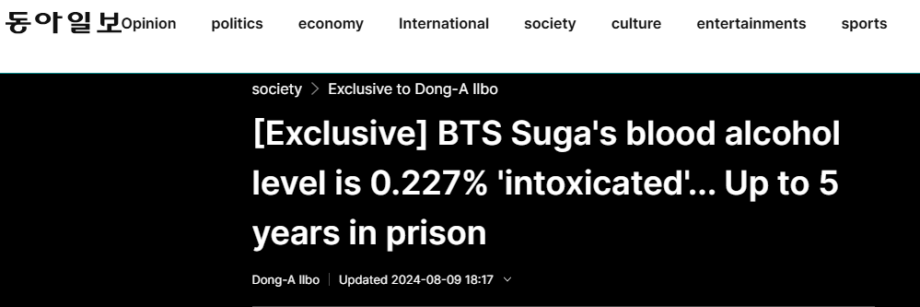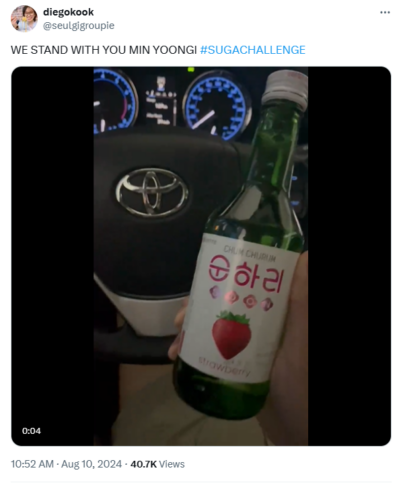The recent controversy involving BTS’s Min Yoongi, also known as SUGA of BTS or August D, became another incident that makes you question the integrity of some media. On August 6, 2024, a minor incident escalated into a full-blown media scandal, so many questions arose. How did Suga’s Drunk Driving Incident unfold? Was Suga drunk driving? Will Suga face a prison sentence for drunk driving? What was his BAC level? What was the role of the media in this DUI case? Why are there broader implications for South Korean journalism?
Suga’s Drunk Driving Incident – The Truth
On August 6, 2024, Min Yoongi, aka SUGA, fell from his electric scooter near his home in Hannam-dong in Seoul, South Korea. Min Yoongi and his label, Big Hit Music, responded with statements on Weverse, where Min Yoongi apologized for his actions and promised to be more careful. Both statements mentioned that the police officers who were at the scene detected alcohol on his breath and administered a breathalyzer test. The test result exceeded the legal limit, resulting in a fine and a revocation of his driver’s license. However, the police released no official statement regarding SUGA’s blood alcohol content.
The actual CCTV footage, released on August 14, 2024, revealed by TV Chosun, provided a clearer picture of the incident. It showed Min Yoongi slowly driving an e-scooter before it lost its balance, causing him to fall near the entrance of his housing complex. The footage also reveals that he quickly got up, picked up his helmet, and lifted the scooter before three police officers arrived to see if he needed help. Most importantly, it was clear that no property or person was harmed in this incident, except perhaps Min Yoongi himself, who may have scraped his knee while falling.
The Irresponsibility of Korean Media Regarding SUGA’s DUI Case
Soon after Suga’s drunk driving incident, the media reacted swiftly and intensely—writing over 1,000 articles within days. The news made headlines and trended on Naver and social media. Despite the lack of concrete evidence, numerous outlets reported speculative and contradictory stories. CCTV footage of individuals on scooters, incorrectly identified as Min Yoongi, was circulated widely.
The prominent news provider in South Korea, JTBC, released CCTV footage claiming Min Yoongi was drunk and driving what appears to be a bike or scooter fast on a busy road. This added to the confusion and fueled further speculation, causing public outrage.

Another popular newspaper, Dong-A Ilbo, published a report claiming Min Yoongi’s BAC was 0.227%, a figure not confirmed by police. Many other news outlets and media, including the reputable Western media, published news referencing these without vetting the facts.

The actual CCTV footage, released on August 14, 2024, provided a clearer picture of the incident. It showed Min Yoongi slowly driving an e-scooter with a saddle before falling near his home. This footage contradicted earlier sensationalized reports. Some silently eradicated their previous incorrect reports and kept mum on their participation in spreading misinformation. However, despite the evidence disproving earlier reports, many outlets continued to promote misleading narratives on “Suga’s drunk driving incident”.
Media Bias and Misinformation, False Attributions and Its Impact
The intense scrutiny of Suga’s accident has revealed troubling biases in South Korean media coverage. The media’s response was disproportionate to a trivial incident that did not need to be treated at the same level, if not more, as a hit-and-run case under DUI. Despite CCTV footage showing that he wore a helmet, adhered to the designated path, and fell only while taking a sharp turn, South Korean publications relentlessly targeted him. The coverage included disseminating fake CCTV footage, significantly tarnishing his reputation.
In stark contrast, a similar DUI incident involving former baseball player Jang Won-sam in the same month received minimal media attention. Jang’s collision, which also resulted in a high blood alcohol level, was only briefly reported. The disparity in coverage has enraged SUGA’s fans, who view the media’s harsh treatment of the BTS member as unjust.
While both cases are acts of breaking the law and should receive the due punishment, the stark contrast in how the media treated each case is concerning.
After the discrimination towards Min Yoongi, in this case, was called out, the situation was exacerbated by apologies from JTBC Newsroom and KOREA NOW, which admitted their errors but did not fully address the extent of the misinformation spread. Fans are questioning the media’s bias and the unequal treatment of public figures, highlighting the broader issue of media sensationalism and its impact on individuals’ reputations.
Media Misconduct and Smear Campaigns against BTS in the past
This is not the first time BTS has faced media scrutiny. In 2019, JTBC’s fabricated report about the group led to Big Hit Music releasing CCTV footage to debunk the false claims. Despite an apology from JTBC, the incident remains a sore point. The smear campaign against Min Yoongi reflects a troubling pattern of media misconduct toward BTS.
BTS unwittingly became collateral damage in a legal battle between their parent company, Hybe Corporation, and Min Hee-jin, the CEO of Hybe’s label, ADOR. BTS was dragged into this issue due to some claims she made, which were followed by an online and media smear campaign in South Korea.
2024 – stock manipulation case involving Min Hee-jin: How Did BTS Become Victims in a Smear Campaign Despite Organic Success
The Role of Anti-Fans and Rumor Spreaders and False Attributions by Media
The actions of anti-fans and rival fan groups further complicated the controversy.
In a particularly troubling development, wreaths with messages urging Min Yoongi to leave BTS were placed outside Hybe’s headquarters. These wreaths were incorrectly attributed to ARMY. The police later removed them, and while the individual behind the post admitted to acting alone, the media used this as an opportunity to vilify Min Yoongi and his fans further. The media’s relentless pursuit of sensationalism overshadowed the truth, contributing to a broader narrative of media manipulation.
Another disturbing trend, the “Suga Challenge,” has emerged on social media, where Individuals posted videos of themselves allegedly driving under the influence. This aimed to create a narrative that fans follow Min Yoongi’s example. The media picked up these videos, falsely linking them to BTS’s ARMY, intensifying the smear campaign. In reality, the videos were posted by fans of other groups and could be confirmed by investigating their profiles.
An example of one such user who participated in the “Suga Challenge” pretended to be a fan:


The Media’s Failure to Correct Errors
When accurate CCTV footage was released on August 14, many media outlets remained silent or quietly deleted erroneous articles and videos. For example, JTBC, a network that had previously shared false footage, removed content without issuing a formal correction or apology. However, in response to the protest by BTS ARMY, trending on social media, “jtbc apologize to bts”, one of the broadcaster’s major advertisers announced that they would suspend advertising until an apology was issued. A few hours later, the JTBC network confirmed that Min Yoongi was not the person in the CCTV footage they released earlier and apologized for any confusion.
The lack of accountability from these media outlets highlights a significant issue in South Korean journalism: the failure to address and correct misinformation publicly.
Comparison to Previous Scandals
The Min Yoongi case echoes previous scandals in South Korea, such as the tragic case of actor Lee Sun-kyun. After being falsely accused of drug use, Lee faced relentless media coverage despite testing negative. This media frenzy, coupled with public scrutiny, contributed to Lee’s tragic death by suicide on December 27, 2023. The Korea Herald and Paris Match criticized the media’s role in Lee’s death, yet similar practices were evident in the coverage of Min Yoongi.
Another relevant case is that of Tablo, a musician from Epik High, who faced a vicious online witch hunt in 2010. Accusations regarding fabricated academic credentials led to severe media scrutiny and cyberbullying despite Tablo providing clear evidence of his degrees. The case underscored the dangers of unchecked media sensationalism and parallels the current treatment of Min Yoongi.
The Media Culture in South Korea
In South Korea, some media often lacks journalistic integrity and prioritizes dramatic spectacles over accurate reporting. Media outlets frequently chase eye-catching headlines and sensational stories rather than adhering to thorough and fair journalism. They exploit celebrities’ personal lives to grab audience attention and boost viewership, often sacrificing truth and fairness.
Min Yoongi’s DUI incident exemplifies this troubling trend. The media subjected his case to intense scrutiny, marked by misinformation and unverified claims. The frenzy around Min Yoongi coincided with major political controversies, including investigations into First Lady Kim Keon-hee’s alleged bribery scandal and other high-profile cases. This timing suggests that the media might have used Min Yoongi’s situation as a PR stunt to distract from these more significant issues.
This pattern of undermining journalistic integrity is not new in South Korea. The media has a history of amplifying celebrity scandals to dominate news cycles and attract higher ratings. This focus on scandal and sensationalism often overshadows more substantial and urgent news, eroding the quality of journalism and public trust. By prioritizing attention, engagement and profit over accuracy and fairness, the media perpetuates a cultural issue where personal gains precede responsible reporting.
The BTS ARMY’s Response
Despite the media onslaught, BTS’s global fanbase, ARMY, has stood firm in support of Min Yoongi. They started the Purple Ribbon Project to support their idol amidst discrimination and media frenzy. While the BTS fandom ARMY made it clear that they agreed Suga made a mistake, accepted his apology, and trusted his promise to do better, they stood together, fighting against media bias and discrimination. Fans have actively challenged false narratives and continued to promote and support Min Yoongi’s and BTs’s music, including his songs “Snooze,” and “Polar Night“, which address the pressures of celebrity culture and selective hypocrisy.
Re-cap: The Latest Target in the BTS Smear Campaign
The Min Yoongi scandal highlights significant issues within South Korean media, including sensationalism, misinformation, and a lack of accountability. The media’s relentless pursuit of scandal, often at the expense of truth and fairness, can have severe consequences for those involved. As the investigation continues, the need for responsible journalism and ethical reporting remains crucial. The media’s recent treatment of Min Yoongi and previous similar cases and other attempts at launching a smear campaign against BTS is a stark reminder of the importance of integrity in journalism and the potential impact of unchecked sensationalism on individuals and public perception.
Sources:
desimartini. (2024, August 14). Is BTS’ SUGA used as bait? Media silence on anti-corruption officer’s death leading probe against South Korea’s First Lady raises questions by ARMY. Desimartini. https://www.desimartini.com/international/ott/is-bts-suga-used-as-bait-media-silence-on-anti-corruption-officers-death-leading-probe-against-south-koreas-first-lady-raises-questions-by-army/f180423d05185/
McLaren, B. (2024, August 7). BTS: Suga apologises for driving scooter under influence. https://www.bbc.com/news/articles/cy0rl85rjvyo
Min Yoongi and the Korean Media: A Modern-Day witch hunt? (2024, August 19). South Korea’s Bullying Culture. https://mediaunmasked7.wordpress.com/2024/08/15/min-yoongi-and-the-korean-media-a-modern-day-witch-hunt/
Netizenme, W. T.-. (2024, May 7). How did BTS become victims in a smear campaign despite organic success. Knowledge Netizen. https://netizenme.com/bangtan-boys/how-bts-became-victims-in-a-smear-campaign-despite-organic-success/
Weverse – official for all fans. (n.d.). https://weverse.io/bts/artist/2-146525694
